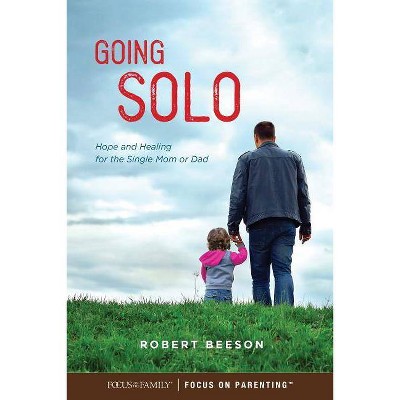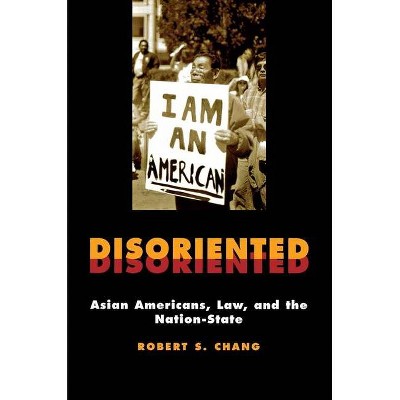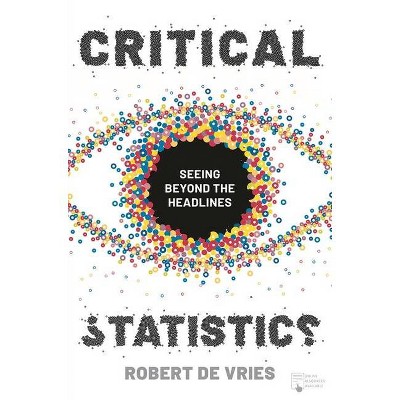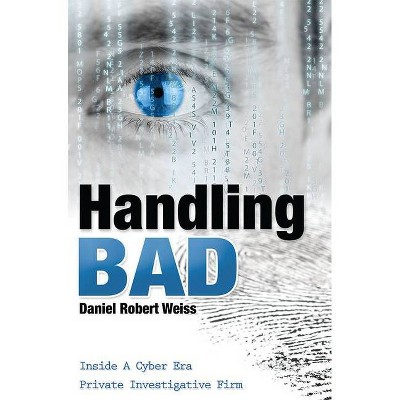Going Critical - by Joel S Wit & Daniel B Poneman & Robert L Gallucci (Paperback)
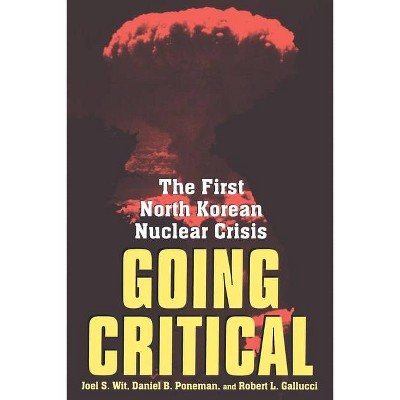
Similar Products
Products of same category from the store
AllProduct info
<p/><br></br><p><b> About the Book </b></p></br></br><p>A decade before being proclaimed part of the axis of evil, North Korea raised alarms in Washington, Seoul, and Tokyo as the pace of its clandestine nuclear weapons program mounted. When confronted by evidence of its deception in 1993, Pyongyang abruptly announced its intention to become the first nation ever to withdraw from the Nuclear Non-Proliferation Treaty, defying its earlier commitments to submit its nuclear activities to full international inspections. U.S. intelligence had revealed evidence of a robust plutonium production program. Unconstrained, North Korea's nuclear factory would soon be capable of building about thirty Nagasaki-sized nuclear weapons annually. The resulting arsenal would directly threaten the security of the United States and its allies, while tempting cash-starved North Korea to export its deadly wares to America's most bitter adversaries. In Go <i>ing Critical, </i>three former U.S. officials who played key roles in the nuclear crisis trace the intense efforts that led North Korea to freeze--and pledge ultimately to dismantle--its dangerous plutonium production program under international inspection, while the storm clouds of a second Korean War gathered. Drawing on international government documents, memoranda, cables, and notes, the authors chronicle the complex web of diplomacy--from Seoul, Tokyo, and Beijing to Geneva, Moscow, and Vienna and back again--that led to the negotiation of the 1994 Agreed Framework intended to resolve this nuclear standoff. They also explore the challenge of weaving together the military, economic, and diplomatic instruments employed to persuade North Korea to accept significant constraints on its nuclear activities, while deterring rather than provoking a violent North Korean response. Some ten years after these intense negotiations, the Agreed Framework lies abandoned. North Korea claims to possess some nuclear weapons, while threatening to produce even more. The story of the 1994 confrontatio<p/><br></br><p><b> Book Synopsis </b></p></br></br><p>A decade before being proclaimed part of the axis of evil, North Korea raised alarms in Washington, Seoul, and Tokyo as the pace of its clandestine nuclear weapons program mounted. When confronted by evidence of its deception in 1993, Pyongyang abruptly announced its intention to become the first nation ever to withdraw from the Nuclear Non-Proliferation Treaty, defying its earlier commitments to submit its nuclear activities to full international inspections. U.S. intelligence had revealed evidence of a robust plutonium production program. Unconstrained, North Korea's nuclear factory would soon be capable of building about thirty Nagasaki-sized nuclear weapons annually. The resulting arsenal would directly threaten the security of the United States and its allies, while tempting cash-starved North Korea to export its deadly wares to America's most bitter adversaries. In Go <i>ing Critical, </i>three former U.S. officials who played key roles in the nuclear crisis trace the intense efforts that led North Korea to freeze--and pledge ultimately to dismantle--its dangerous plutonium production program under international inspection, while the storm clouds of a second Korean War gathered. Drawing on international government documents, memoranda, cables, and notes, the authors chronicle the complex web of diplomacy--from Seoul, Tokyo, and Beijing to Geneva, Moscow, and Vienna and back again--that led to the negotiation of the 1994 Agreed Framework intended to resolve this nuclear standoff. They also explore the challenge of weaving together the military, economic, and diplomatic instruments employed to persuade North Korea to accept significant constraints on its nuclear activities, while deterring rather than provoking a violent North Korean response. Some ten years after these intense negotiations, the Agreed Framework lies abandoned. North Korea claims to possess some nuclear weapons, while threatening to produce even more. The story of the 1994 confrontation provides important lessons for the United States as it grapples once again with a nuclear crisis on a peninsula that half a century ago claimed more than 50,000 American lives and today bristles with arms along the last frontier of the cold war: the De-Militarized Zone separating North and South Korea.</p><p/><br></br><p><b> Review Quotes </b></p></br></br><br><P>.".. a comprehensive insider's guide to the first North Korean nuclear standoff and an essential tool for comparing today's events to the last round...[The authors] argue convincingly that Washington cannot contract out its foreign policy on an interest as vital as assuring nuclear nonproliferation." --Scott Snyder, Asia Foundation, "Foreign Affairs", 7/1/2004<br><br><P>"a 'how to' read for walking the minefield that constitutes relations and dealings with North Korea" --Chris Price, "JoongAng Daily", 10/1/2005<br><br><P>"Far beyond simply providing prelude and understanding to current events, Wit, Poneman, and Gallucci have given us a fascinating, blow-by-blow account of the stark nuclear crisis of 1994. This is a valuable book." --Brent Scowcroft, former National Security Adviser<br><br><P>"From cabinet meetings is Washington to Geneva talks and North Korean associations with China, GOING CRITICAL is a 'must' for any who would understand the latest issues and their ongoing implications for a nuclear crisis." -- "The Bookwatch", 9/4/2004<br><br><P>"Going Critical is and should remain valuable reading for those interested not only in the North Korean crises of past and present, but in government decision-making, the practice of diplomacy, and non-proliferation more generally." --Sheena E. Chestnut, St. Antony's College, Oxford, "Millennium", 11/1/2007<br><br><P>"Going Critical represents the collective reconstruction of events by three US officials intimately involved in negotiating with North Korea in 1994 leading to the dismantling of plutonium production facilities under international inspection....[It] is definitely the most factual account of the 'first North Korean Nuclear crisis' lent authority by the key negotiators from the American side." --Geoffrey C. Gunn, Faculty of Economics, Nagasaki University, "Journal of Contemporary Asia"<br><br><P>"GOING CRITICAL is an indispensable and fascinating study of high stakes negotiations, national security, and diplomacy. Wit, Poneman, and Gallucci have masterfully collaborated, telling a gripping tale of the first North Korean nuclear crisis and prescribing recommendations that bear on today's similar crisis." --Samuel R. Berger, former U.S. National Security Adviser<br><br><P>"GOING CRITICAL is the definitive account of the first North Korean nuclear crisis. The authors were at the center of this crisis, and thus speak with a unique authority. Their account is comprehensive, objective, and exceptionally well written. I highly recommend this book to Korean scholars and to nuclear policy scholars. It is an indispensable resource to those who are involved with the ongoing negotiations with North Korea." --William J. Perry, former Secretary of Defense<br><br><P>"GOING CRITICAL: THE FIRST NORTH KOREAN NUCLEAR CRISIS presents an authoritative account of the 1994 deal with North Korea.... The new book also provides a lively and engaging look into the inner workings of United States foreign policy making that is sure to captivate North Korea specialists and general readers alike." --Graham Allison, Kennedy School of Government, Harvard University, "The New York Times", 7/20/2004<br><br><P>"In the 90s, North Korea's nuclear ambitions brought the world close to war. Today, those same ambitions have created the most serious crisis facing the United States. For all who want to understand how we got to where we are today, GOING CRITICAL is a must read. It is the very best accounting of the struggle ten years ago to fashion a diplomatic alternative to a potentially catastrophic war." --General John Shalikashvili, former chairman of the Joint Chiefs of Staff<br><br><P>"Reading Going Critical brought back the tensions and concerns of the earlier nuclear crisis of the 1990s. Of the three books under reivew, this is the most scholarly and the one most likely to have lasting value." --James Hoare, "Times Higher Education Supplement", 9/24/2004<br><br><P>"The nightmare of a nuclear North Korea continues to plague American policymakers. Anyone interested in how to handle this fraught problem should consult this definitive account of the first Korean nuclear crisis." --Joseph S. Nye, former Assistant Secretary of Defense and author of "Soft Power"<br><br><P>"This book has convinced me of the wisdom of discussing nuclear weapons with the Pyongyang regime. The authors have done a brilliant job of describing the complex discussions that took place over a number of years, and mirabile dictu, they have kept it interesting throughout. And they have convinced me that there was legitimate purpose to the conversations." --Lawrence Eagleburger, former Secretary of State<br><br><P>"Written with the rare benefit of special access to US government documents and incorporating the personal experiences of its three authors, all of whom played significant roles in the events of 1993-94, Going Critical recounts in detail the options that the Clinton administration considered at every stage of the story - and thus should prove invaluable to the Bush administration today." --Scott Snyder, "Financial Review", 8/27/2004<br><p/><br></br><p><b> About the Author </b></p></br></br><P>Joel S. Wit is a senior fellow with the International Security Program at the Center for Strategic and International Studies. He served for 15 years in the Department of State and was coordinator for the 1994 U.S.?North Korea Agreed Framework. Daniel B. Poneman is a senior fellow with the Forum for International Policy and a principal in The Scowcroft Group. He served on the National Security Council staff under Presidents George H. W. Bush and Bill Clinton, including nearly four years as special assistant to the President for nonproliferation. Robert L. Gallucci is dean of Georgetown University's Edmund A. Walsh School of Foreign Service. A career civil servant in the Department of State, he led the team that negotiated the Agreed Framework and served as assistant secretary for political-military affairs and ambassador-at-large.
Price History
Price Archive shows prices from various stores, lets you see history and find the cheapest. There is no actual sale on the website. For all support, inquiry and suggestion messages communication@pricearchive.us

